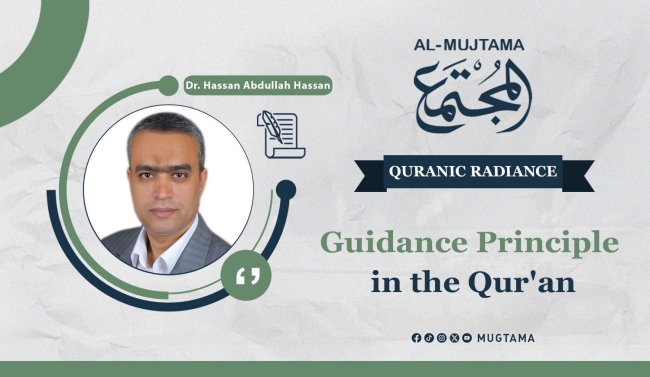Guidance Principle in the Qur'an Featured
The principle of guidance is the primary purpose of the Qur'an, as the Qur'an itself mentions and describes its aim as guiding people to the truth. This guidance directs humans to their true nature (fitrah) and uprightness according to their creation and inherent capabilities. Here, we outline the Qur'anic context of the principle of guidance as found in the ayahs of the Qur'an:
- “This is the Book about which there is no doubt, a guidance for those conscious of Allah.” (Al-Baqarah: 2)
- “Whoever follows My guidance - there will be no fear concerning them, nor will they grieve.” (Al-Baqarah: 38)
- “In which was revealed the Qur'an, a guidance for the people.” (Al-Baqarah: 185)
- “This [Qur'an] is a clear statement to [all] the people and a guidance.” (Al-Imran: 138)
- “That is the guidance of Allah by which He guides whomever He wills of His servants.” (Al-An’am: 88)
- “And We had certainly brought them a Book which We detailed by knowledge - as guidance and mercy to a people who believe.” (Al-A'raf: 52)
- “And if you invite them to guidance.” (Al-A'raf: 198)
- “This [Qur'an] is enlightenment from your Lord and guidance.” (Al-A'raf: 203)
- “It is He who sent His Messenger with guidance.” (At-Tawbah: 33)
- “And We have not revealed to you the Book, [O Muhammad], except for you to make clear to them that wherein they have differed and as guidance.” (An-Nahl: 64)
- “As guidance and good tidings for the believers.” (An-Naml: 2)
- “Indeed, it is guidance and mercy for the believers.” (An-Naml: 77)
- “As guidance and mercy for the doers of good.” (Luqman: 3)
- “Say, 'It is for those who believe a guidance.'” (Fussilat: 44)
- “This [Qur'an] is enlightenment for mankind and guidance.” (Al-Jathiyah: 20)
- “It is He who sent His Messenger with guidance.” (Al-Fath: 28)
- “And there has already come to them from their Lord guidance.” (An-Najm: 23)
- “When we heard the guidance.” (Al-Jinn: 13)
The concept of guidance and its synonyms, as clarified by these ayahs, refer to three main aspects:
- The Qur'an describing itself as a guidance for people; meaning it achieves guidance for them, or that people seek guidance from the Qur'an.
- The Qur'an inviting people to guidance; the ultimate goal of the Qur'an is to lead people to the path of truth and avoid the paths of falsehood in all its forms.
- Guidance being the ultimate goal of the prophetic mission to people, which is achieved through the Qur'an and by the Qur'an.
Furthermore, this guidance (in all its forms) is offered to all creation: people, believers and non-believers, the obedient and the disobedient, indeed to all the worlds.
From a linguistic perspective: there are two guidances: guidance by indication, which is within the capacity of the messengers and their followers. The second is guidance by leading: guiding believers to the paths of Paradise and the ways leading to it. To guide someone to a path means to show it to them and make it known to them, and it also means the direction leading to the goal, enlightenment, and knowledge.
Al-Razi mentions in his explanation of the ayah “It is He who sent His Messenger with guidance and the religion of truth to manifest it over all religion.” (At-Tawbah: 33) that guidance means the criterion, and “to manifest it” means to elevate it above all religions through evidence, proof, and clarity, so that nothing remains hidden, and showing what is right in the religion and its alignment with wisdom and benefit in both this world and the Hereafter.
Therefore, guidance, as described, is: enlightenment, knowledge, direction, and the means leading to the objective or purpose.
On the other hand, Al-Raghib Al-Asfahani sees that Allah has granted humans four types of guidance as established in the Qur'an:
- The guidance that encompasses every accountable person with reason, intelligence, and necessary knowledge, as mentioned in “Our Lord is He who gave each thing its form and then guided [it].” (Taha: 50)
- The guidance by calling people through the prophets and the revelation of the Qur'an, which is meant by “And We made them leaders guiding by Our command.” (Al-Anbiya: 73)
- The divine success granted to those who are guided, which is the meaning of “And those who are guided - He increases them in guidance.” (Muhammad: 17)
- The guidance in the Hereafter to Paradise, which is meant by “He will guide them and amend their condition.” (Muhammad: 5)
These four types of guidance are sequential: if one does not receive the first type, they do not receive the second. Without the second, the third and fourth types are unattainable. If one receives the fourth, they have already received the preceding three.
Guidance also requires education and effort. While not everyone who learns or strives achieves guidance, these are prerequisites for true guidance, leading to the understanding that humans are not born with minds as blank slates but are endowed with the capacity for guidance, however, they need direction, explanation, evidence, and proof to awaken these capacities, inherent in their nature.
The objectives of guidance in the Qur'an encompass both worldly and Hereafter matters. Guidance applies to what a person seeks by choice, whether in worldly or Hereafter affairs. One who follows a scholar is called “guided,” and guidance generally means seeking or emulating guidance with earnestness.
-------------------------------------------------------------

